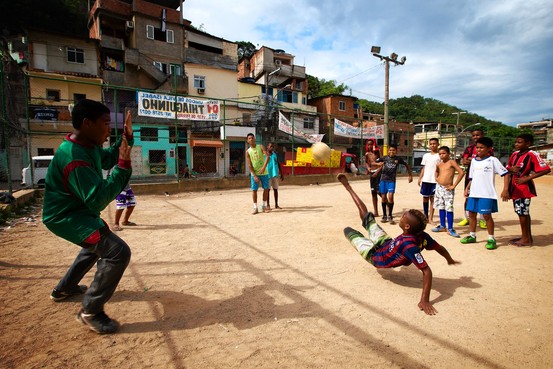
Colonial Underpinnings of the Beautiful Game
[Photo credit: WSJ.com]
Today is Global South Sunday, where we examine goings on south of the equator.
I’m generally not much of a sports fan, but I do enjoy the political underpinnings of big world sports events like the Olympics and the World Cup. As a kid in a family of huge sports fans, I watched a lot of Olympics, but as an adult with in a city of immigrants with a number of first and second generation immigrant friends (and being a second generation Filipino-American myself), I’ve caught quite a bit of the 2010 and 2014 World Cups.
In many countries that are former colonies, you can use the national sport to guess who was the most recent colonizer. I was thinking about this in terms of the Philippines– it’s most popular sport is basketball, a reflection of its recent history as a US colony. I’ve wondered a bit about this, as many Filipinos (including myself) aren’t very tall, and the country’s performance on the global basketball stage is generally not outstanding. The Philippines is also a former Spanish colony, which makes me wonder why football (soccer) is not more popular. But that said, American culture is much more admired in the Philippines than Spanish culture, primarily because of America’s economic dominance– until recently, the “American dream” was still alive and well in the Philippines.
For other former Spanish colonies, taking up football is an entirely different story– in much of South America, for instance, football is practically a religion. For Brazil, football is a religion, which made the astonishing 7-1 German/Brazil match this past week particularly crushing. One of my football-watching bros told me that he read this comment from Germany’s Chancellor Angela Merkel: Germany’s win resulted in part from its players all playing for German football clubs, while Brazil’s players are professionally dispersed throughout teams on multiple continents. If Merkel made this comment (which I was not able to locate from multiple searches), she perhaps unwittingly underlined to the economic inequity between football’s two major powers: Europe and Latin America.
While Matthew Futterman says in the Wall Street Journal that “countries small and large and rich and poor have excelled at the World Cup,” the richest football clubs in the world are in Europe. Rob Hughes, in his New York Times pre-game analysis of tomorrow’s World Cup final, points out that “the days have gone when South American clubs can hold onto star players and, whereas many of them have had long, hard seasons for clubs in Spain, England and Italy, that is again an area where Germany is better prepared” with one of the richest football leagues in the world.
By no means am I a sports analyst, historian, or economist. But Brazil’s crushing loss to Germany, and Germany being favored to win its final match against Argentina tomorrow, indicate to me that perhaps the South American teams need to provide economic incentives to their players so as to keep them united at home. In a world where athletes are sometimes paid inordinately high salaries, I’m not sure if this is ultimately a way to address inequity. On the other hand, for economically emerging countries like Brazil and Argentina, where football is the national sport, this approach to retention of football players could be a very good move.